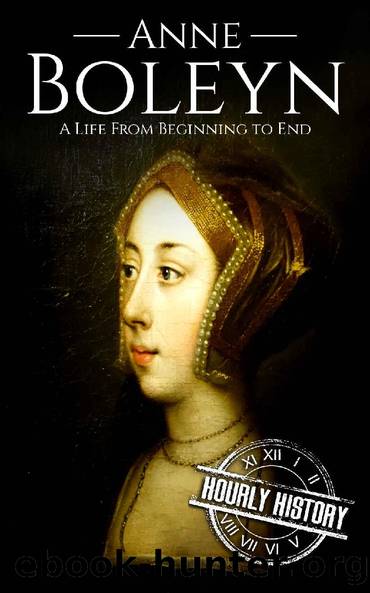Anne Boleyn: A Life From Beginning to End (Biographies of British Royalty Book 16) by Hourly History

Author:Hourly History [History, Hourly]
Language: eng
Format: epub
Publisher: Hourly History
Published: 2019-04-22T00:00:00+00:00
Chapter Six
The Kingâs Great Matter
âIf it ever lay in my power, I will work the Cardinal as much displeasure as he has done to me.â
âAnne Boleyn about Cardinal Wolsey
Although Pope Clement VII was clearly reluctant to involve himself in what was referred to as the âKingâs Great Matter,â Anne blamed Cardinal Wolsey for delaying and hindering the annulment.
Due to the power of Emperor Charles V, all of Europe now became enmeshed in Henryâs private affairs. With the Treaty of Cambrai, Charles gathered all of Henryâs enemies against him. The emperor also sent Eustace Chapuys to London to serve as the imperial ambassador. For seven years, Chapuys spied on the English court and sent information back to Charles, specifically information relating to Catherine and her daughter, Mary.
Chapuys became one of Catherineâs greatest supporters and remained devoted to her throughout the rest of her life. He hated Anne, and all of his reports to the emperor were filled with insults about the âwhoreâ or âconcubine,â as he called her. He placed his spies everywhere. Although he never once met Anne, he no doubt referenced Catherineâs own language when referring to the younger woman. At any opportunity, Chapuys spreads vicious lies about Anne to anyone who would listen. He became one of her worst enemies at court.
With their relationship out in the open, Anne joined Henry on his summer progress, although still not his bed. Upon their return to London, a frustrated Campeggio returned to Rome due to lack of any progress. Henry had him followed. He had heard that Wolsey had placed a spy with Campeggio to take Anneâs secret letters to Henry back to the pope. Wolsey was still desperately hoping for evidence that could be used to smear Anne. Campeggio was stopped at Dover, and the letters were indeed found in his possession. None of the letters contained any suggestion that Anne was or had ever been Henryâs mistress. They were perfectly harmless.
Henryâs patience with Wolsey was waning. For his deception, Wolsey was forced to leave his London home, York Place, and dismissed as chancellor, but he still escaped prisonâfor the time being. He was replaced as chancellor by Thomas More, a fanatic opponent of the Reformation.
The confiscation of Wolseyâs fabulous palaces helped stir up considerable anti-Rome sentiments among the population. These properties, York Place (later renamed Whitehall Palace) and Hampton Court, were grander than most of the kingâs residences and rivaled Versailles in splendor. Wolsey had accumulated a fortune and loved to show off his wealth. The populace began to wonder just how much money clerics were taking in. The fact was bishops, cardinals, and other clerics charged hefty fees for everything. With the corruption of Rome brought to light, many English citizens saw the move away from the papacy as the best possible future for England. For Anne, this subtle move away from Rome could only be good news.
Theologian Thomas Cranmer and George Boleyn discussed the radical idea that Henry was under the sole authority of God, not Rome.
Download
This site does not store any files on its server. We only index and link to content provided by other sites. Please contact the content providers to delete copyright contents if any and email us, we'll remove relevant links or contents immediately.
Machine Learning at Scale with H2O by Gregory Keys | David Whiting(4313)
Never by Ken Follett(3954)
Harry Potter and the Goblet Of Fire by J.K. Rowling(3856)
Fairy Tale by Stephen King(3394)
Unfinished: A Memoir by Priyanka Chopra Jonas(3388)
The Man Who Died Twice by Richard Osman(3077)
Will by Will Smith(2919)
It Starts With Us (It Ends with Us #2) by Colleen Hoover(2367)
Rationality by Steven Pinker(2363)
Can't Hurt Me: Master Your Mind and Defy the Odds - Clean Edition by David Goggins(2339)
The Dark Hours by Michael Connelly(2307)
The Storyteller by Dave Grohl(2234)
Friends, Lovers, and the Big Terrible Thing by Matthew Perry(2230)
The Dawn of Everything: A New History of Humanity by David Graeber & David Wengrow(2208)
The Becoming by Nora Roberts(2201)
The Stranger in the Lifeboat by Mitch Albom(2120)
Cloud Cuckoo Land by Anthony Doerr(2110)
Love on the Brain by Ali Hazelwood(2075)
Einstein: His Life and Universe by Walter Isaacson(2021)
